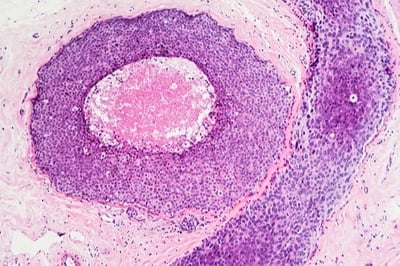FORCE's eXamining the Relevance of Articles for You (XRAY) program looks behind the headlines of cancer news to help you understand what the research means for you.
XRAY is a reliable source of hereditary cancer research-related news and information.
Learn more about the XRAY program
All XRAYs
Study : Financial burden affects quality of life of cancer survivors
Most relevant for: People diagnosed with cancer
Cancer-related financial burden can keep survivors from getting the care that they need, yet how this burden affects mental and physical health is still unknown. A study found that almost one-third of cancer survivors report having financial burden; those most likely to be affected were under age 65, female, members of racial or ethnic minority groups, and people who lack access to adequate insurance. (5/17/16)
Read More
Relevance: Medium


Strength of Science: Medium


Study : More patients with invasive breast cancer opting for double mastectomies
Relevance: Medium


Strength of Science: Medium


Most relevant for: Women diagnosed with breast cancer who are recommended to undergo a single mastectomy
There are a number of surgical options for treating invasive breast cancer. These include lumpectomy with radiation, a single mastectomy to remove only the breast with cancer, or a double mastectomy, which removes both breasts. A new study finds that more women are choosing double mastectomy, even though it does not increase overall survival for these patients. (5/3/2016)
Read More
Relevance: Medium


Strength of Science: Medium


Research Timeline: Human Research


Study : Cellular diversity in tumors may predict survival for some types of breast cancer
Relevance: Medium


Strength of Science: Medium


Research Timeline: Human Research


Most relevant for: People diagnosed with breast cancer that is "high-grade" or aggressive
Some tumors are made up of many different types of cells, while others contain generally the same cell type. This study found that among people with high-grade breast cancer, those who have tumors made up of many different cell types have a lower 10-year survival rate than people with tumors containing only a single type of cells. This research is an early step towards developing a new test that can help physicians identify cancers that need more aggressive treatment, but more research is needed before it is ready for clinical use. (4/26/16)
Read More
Relevance: Medium


Strength of Science: Medium


Research Timeline: Human Research


Study : Is breast cancer risk increased in women who test negative for the BRCA mutation in their family?
Relevance: Medium


Strength of Science: Medium


Research Timeline: Human Research


Most relevant for: Women from a family with a known BRCA mutation who tested negative for the mutation in the family
Some women who do not carry a BRCA mutation, but come from a BRCA-positive family, still develop breast cancer. This research examines whether these women are at higher risk for breast cancer, or whether their risk is similar to women in the general population. (4/19/16)
Read More
Study : Factors that affect the ability to work in people with metastatic cancer
Most relevant for: People living with metastatic cancer
Some patients who live with metastatic cancer either want or need to continue working while coping with symptoms of their disease and treatment. A recent study that looked at over 600 people with metastatic breast, prostate, colon, or lung cancer found that about one-third of them continue working full or part time. People most likely to continue working were those undergoing hormonal treatment and those with less severe symptoms or side effects from treatment. (4/12/16)
Read More
Article : New York Times report demonstrates need for genetic counseling, but doesn’t give the whole story
Most relevant for: People diagnosed with breast cancer
A New York Times report discussed how genetic testing could provide “grim data” without guidance for patients. While this is a valid concern, this report does not sufficiently emphasize certain important issues regarding genetic testing, particularly the need for genetic counseling by a health care provider with expertise in genetics before and after genetic testing. (4/5/16)
Read More
Study : BRCA testing in young women with breast cancer
Most relevant for: Young women diagnosed with breast cancer who have not yet had genetic testing
National guidelines recommend genetic testing for BRCA mutations in young women who are diagnosed with breast cancer. However, little is known about how women decide to get testing, or how they use genetic information to decide on treatment options. This study found that genetic testing is increasing among young breast cancer survivors, and it explores some of the factors that play into patients’ decision making about genetic testing. (3/22/16)
Read More
Study : Do women who eat a high fiber diet have a lower risk of breast cancer?
Most relevant for: Adolescent and young adult women
Some researchers believe that dietary fiber may decrease breast cancer risk by lowering estrogen levels in the blood. However, many previous studies have failed to find a link between fiber consumption and lower breast cancer risk. The current study suggests that consuming high dietary fiber during adolescence and young adulthood may lower breast cancer risk, but more work needs to be done to confirm this finding. In the meantime, everyone is encouraged to eat a variety of high fiber foods for the many well-documented health benefits. (03/08/16)
Read More
Relevance: Medium


Strength of Science: Medium-High


Research Timeline: Post Approval


Study : What are the genetics underlying 12 different cancer types?
Relevance: Medium


Strength of Science: Medium-High


Research Timeline: Post Approval


Most relevant for: People diagnosed with cancer
As gene sequencing has become more affordable, researchers and health care providers are now looking for mutations in many genes beyond BRCA1, BRCA2 and others that are associated with known hereditary cancer syndromes. By sequencing thousands of genes rather than just one or two, researchers can better understand which inherited mutations affect cancer risk. In this study, researchers sequenced thousands of genes in patients with one of 12 cancers, including breast, and catalogued which gene mutations are most commonly found in each cancer. (03/01/16)
Read More
Relevance: Medium-High


Strength of Science: Medium-High


Research Timeline: Post Approval


Study : Smoking before or after a breast cancer diagnosis associated with poorer breast cancer survival
Relevance: Medium-High


Strength of Science: Medium-High


Research Timeline: Post Approval


Most relevant for: People who smoke cigarettes
Cigarette smoking is an important public health issue that causes more than 480,000 deaths annually. Smoking increases the risk of many diseases, from heart disease to stroke. This research indicates that smoking before and or after a diagnosis of breast cancer affects survival, and also shows that it is never too late to quit smoking. (02/23/16)
Read More